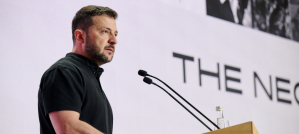Yalta European Strategy (YES) Held Online Conversation with Tony Blair and Ann Applebaum on World that is Emerging and its Meaning for Europe and Ukraine
The Yalta European Strategy in partnership with the Victor Pinchuk Foundation continues its series of online conversations on global challenges and their implications for Ukraine.
During the 5th conversation, held on December 8, 2020, Tony Blair, Executive Chairman of the Tony Blair Institute for Global Change, former Prime Minister Minister (1997-2007) of the United Kingdom, took part in the discussion themed “What world is emerging, and what does it mean for Europe and Ukraine?”. Olha Stefanyshyna, Ukraine’s Deputy Prime Minister for European and Euro-Atlantic Integration, and Kurt Volker, Ambassador (ret.); Executive Director, McCain Institute for International Leadership, Arizona State University, joined the discussion and asked the key speaker their questions. The conversation was moderated by Ann Applebaum, historian and Pulitzer Prize-winning author. Victor Pinchuk, founder of YES, Victor Pinchuk Foundation, EastOne group, opened the conversation.
When introducing Tony Blair in his introductory remarks, Victor Pinchuk stressed that there are not so many people with such a distinguished strategic vision and experience that are “not only up to date, but also up to tomorrow.”
Tony Blair commented on choices in dealing with the competing powers, China and the US: “For a country like Ukraine, the important thing is to realise that your core security relationship will be with America and America’s allies. That is not to say that you can’t engage with China and have trade with it. But probably you are going in future to have to do that fairly judiciously, and make sure that, when it comes to questions that America will believe impinge on security questions, then it’s going to be at least as well to be in strong consultation with the US and its allies before you take irreparable steps.”
Answering Ann Applebaum’s question about the need for different countries to cooperate more to fight the COVID-19 epidemic, Tony Blair said: “It is maybe true that in the next few months as the vaccine roll-out happens, people will still think of themselves in the first place, but unless there is a total absence of imagination and vision from the part of the global leadership, at the end of this, at any level, there should be a complete top to bottom review of what went wrong and why it should not ever happen again. […] It is beyond doubt that the world should be sitting down working out the answers to these questions for the future, even if in the short term, everyone is going to be looking out for themselves.”
Commenting on things that have to be done to solve the problem of the conflict in Ukraine’s east, Mr. Blair pointed out: “I think, there are two things that are very important: first of all, to make sure that the world does not forget about it, and secondly, to make sure that Ukraine’s sovereignty is understood and respected, and that their allies around the world recognise that this issue is not going to go away for the people of Ukraine. It’s absolutely essential that we do try to resolve, but it’s got to be resolved on the basis that respect Ukraine’s territorial sovereignty and independence.”
Tony Blair touched upon the technology revolution and the prospects it is opening for countries like Ukraine: “The technical revolution changes everything, and it is going to change every aspect of our lives. This is the moment when we need to put together the changemakers who are inventing the technology and the policy makers – the politicians. It is to realise that the tech revolution is also an opportunity for countries to transform healthcare, education, transport, law and order, the way that government works, and in my view, the group of politicians that understand and master and share how this technology revolution could be harnessed for the for the good of the world are the ones that are going to win. And for a country like Ukraine that has great young entrepreneurs and really smart people who are going to be inventing and doing stuff – and the best environment needs to be created for them to flourish - can use the technology revolution to bypass some of the legacy systems of the west.”
The YES Annual Meeting 2020 was postponed due to the COVID-19 pandemic. YES and the Victor Pinchuk Foundation remain committed to integrating Ukraine with the world and put the country on the international agenda. Since 2004, Yalta European Strategy has been the main non-governmental platform for connecting the world and Ukraine. The YES Annual Meetings have brought together world political, business and thought leaders to discuss Ukraine’s future and pressing global challenges.
The video of the event is available at https://youtu.be/_Qgl_EmnLhY
←Back to news list

